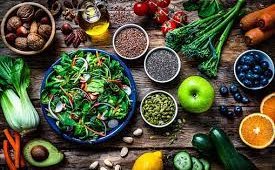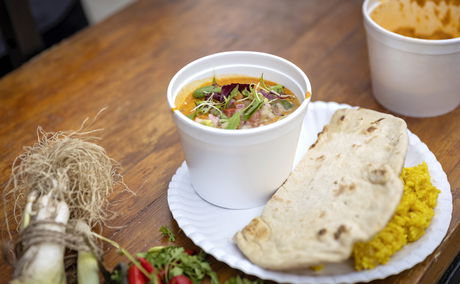The Cape Winelands is a region that truly comes alive through its events. As guests at La Maison On Main, you are perfectly placed to explore everything this vibrant area has to offer. From international music festivals to local harvest celebrations and world-class auctions, the 2026 calendar is packed with must-attend events. Plan your stay around these exciting occasions to make your Winelands experience even more memorable.
Harnessing the Power of Whole Foods: Healing your body naturally, without medication.

In a world saturated with pills and prescriptions, it's empowering to discover that your body has an innate ability to heal itself. While certain medical interventions are necessary in some cases, there is an increasing interest in utilizing whole foods as a means to support the body's natural healing processes. In this article, we'll explore the powerful potential of whole foods in restoring and nourishing your body without relying on medication.
1. The Healing Power of Whole Foods
Whole foods, in their natural and unprocessed state, are abundant in phytochemicals, antioxidants, vitamins, minerals, and fiber. These nutrients work in harmony to provide numerous health benefits and support your body's natural healing mechanisms. Here's how whole foods can contribute to your healing journey:
A. Reducing Inflammation: Chronic inflammation is associated with various health conditions, including arthritis, heart disease, and certain cancers. Whole foods, particularly fruits, vegetables, and herbs, are rich in anti-inflammatory compounds that can help balance your body's inflammatory response.
B. Boosting Immunity: Adequate nutrition is crucial for a robust immune system. Whole foods like citrus fruits, leafy greens, and garlic provide essential vitamins and antioxidants that enhance your body's defenses against infections and diseases.
C. Detoxification and Cleansing: Certain whole foods, like cruciferous vegetables (broccoli, cabbage) and berries, support your body's natural detoxification processes, helping to eliminate toxins and harmful substances.
2. Embracing a Whole Foods Lifestyle
Transitioning to a whole-foods lifestyle may seem challenging initially, but the rewards for your health and well-being make it genuinely worthwhile. Here are some practical tips to help you get started:
A. Emphasize Plant-Based Foods: Incorporate a variety of fresh fruits, vegetables, legumes, and whole grains into your diet. These plant-based foods are rich in nutrients and offer numerous health benefits.
B. Reduce Processed Foods: Processed foods often contain additives, preservatives, and unhealthy fats that can hinder your body's healing processes. Minimize consumption of processed snacks, sugary drinks, and convenience meals.
C. Opt for Organic Choices: Whenever possible, choose organic whole foods to minimize exposure to pesticides, antibiotics, and artificial hormones. Organic produce often contains higher nutrient levels as well.
D. Mindful Eating: Slow down and savor your meals. Mindful eating encourages awareness, helping you make better food choices and promoting proper digestion.
3. Healing Through Specific Whole Foods
Certain whole foods have been used for centuries to assist in healing various ailments. Consider incorporating the following into your diet:
A. Turmeric: This vibrant yellow spice contains curcumin, a powerful anti-inflammatory compound. Turmeric has been used in traditional medicine to alleviate symptoms of arthritis, depression, and digestive disorders.
B. Ginger: Known for its digestive properties, ginger can help soothe an upset stomach, reduce nausea, and alleviate inflammation in the body.
C. Garlic: Garlic possesses antimicrobial properties that support immune function. It also aids in reducing blood pressure and improving cardiovascular health.
D. Leafy Greens: Spinach, kale, and Swiss chard contain vitamins, minerals, and antioxidants that help combat oxidative stress and support overall health.
E. Berries: Blueberries, strawberries, and raspberries are rich in antioxidants that protect against cellular damage, support brain health, and may reduce the risk of chronic diseases.
The healing potential of whole foods is profound. By embracing nutritious, unprocessed foods, you have the opportunity to harness your body's natural healing capabilities without relying solely on medication. Incorporating a variety of fruits, vegetables, whole grains, legumes, and herbs into your diet can support your immune system, reduce inflammation, and aid in detoxification. Embrace the power of whole foods as you embark on a journey of healing and well-being.
I would strongly recommend that you take the time and listen to podcasts with the following doctors on anxiety, cancer, sugar, inflammation, and healing your body naturally:
Dr. Pradip Jamnadas (https://youtu.be/Yg6UhhV_K1s)
Dr. Ragan Chatterjee (https://youtu.be/cNPV_5stNLo)
Dr. William Li (https://youtu.be/cNPV_5stNLo)
Dr. Daniel Amen (https://youtu.be/90bxNpimtb8)
Dr. Andrew Weil (https://youtu.be/bcSr7hueQOo)
Let me know if you enjoyed the content and if you would like to read more about a more natural way of living and healing yourself from within.
Further Reading
We know that booking a self-catering holiday is all about having the flexibility to create your perfect getaway. To ensure a seamless and stress-free experience, we've compiled a list of the most frequently asked questions for our local and international guests planning a visit to La Maison On Main in 2026. Here are the details you need to know before you book your luxury self-catering villa with us in Paarl.
As a 40-year-old mother of two, your health becomes even more vital in order to keep up with the demands of a busy schedule. Diet plays a substantial role in achieving and maintaining optimal health. Two key terms you may have come across are processed foods and whole foods. In this article, we'll explore the differences between these two types of foods and how they can impact your overall well-being.





Share This Post